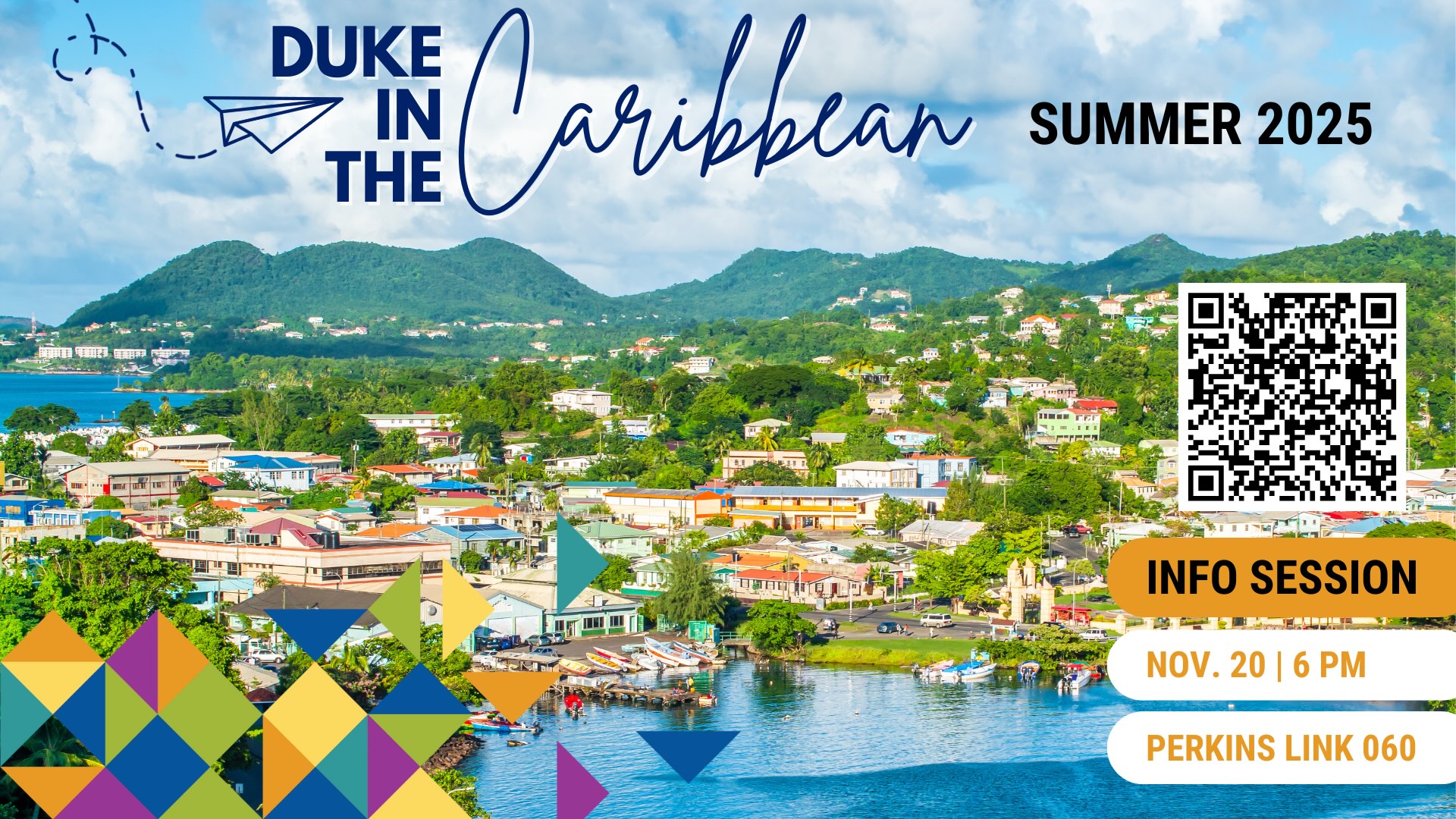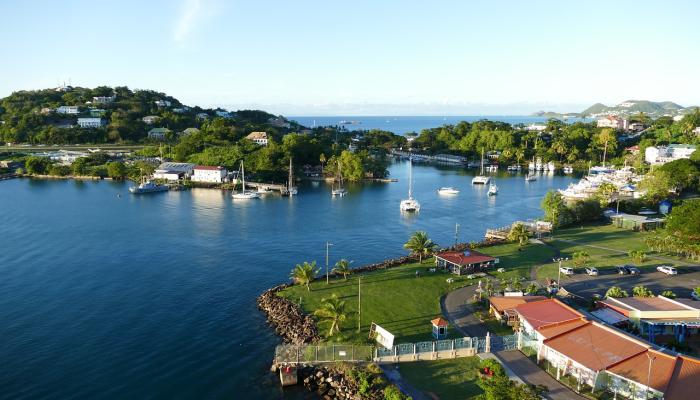Duke in the Caribbean
A 4-WEEK SUMMER CREOLE Language & Culture Program
STUDY Creole Culture and Language in St. Lucia
Apply NowThis one-course program is based in the capital city, Castries. Castries provides an ideal setting for learning Saint-Lucian Creole which is similar to Haitian Creole as well as gaining a deep understanding of the lives of the local peoples in Saint-Lucia while developing advanced Haitian Creole and Saint-Lucian Creole languages skills.

PROGRAM FAST FACTS
Location: Castries, St. Lucia
Term: Summer II
Dates: June 15- July 15, 2025
Application Deadline: February 1st, rolling admission
Academic Theme(s): Creole Language, Caribbean Studies
Credit Type: Duke Credit
Eligibility: Open to all majors, no previous language experience required. Non-Duke students are welcome to apply.
Duke Affiliation: Duke Department of Romance Studies
Housing: Shared hotel rooms
Independent Travel Time During Program: Please do not book any non-program travel until you receive a final itinerary for the program.
Primary Contact: Jacques Pierre
ACADEMICS
You’ll enroll in one course for one Duke course credit. Neither pass/fail nor auditing is permitted.
CULANTH 290A/LATAMER 290A/CREOLE 190A
Exploring the Creole World: Saint-Lucia’s and Haiti’s Creole languages, Culture, and Society
(CZ), 1.0 Credit
This course aims to expose students to the basics of Haitian Creole and particularly Saint Lucian Creole, culture, and society. During this four-week class, students will develop their ability in listening, speaking, reading, and writing in both Creoles whose lexifiers are mostly derived from French due to the fact they were both French Colonies. This class will also give students the opportunity to interact with Saint-Lucians, and the Haitian community there, in a set of various activities to gain a meaningful and insightful experience of Saint-Lucian culture and how Haitian migrants keep their own Creole and culture in the host country.
Instructor: Jacques Pierre
Prerequisites: None
ACTIVITIES
Past activities have included the following:
- Balenbouche Estate
- Castries
- Botanical Gardens
- Volcano caldera and sulphur springs
HOUSING & MEALS
Participants will stay in a hotel with all meals included while at the hotel. Transportation to/from the city center is also included in the hotel costs.
DATES - TBD
Attendance is required at all classes, excursions, and group events. Given the intense nature of this program, late arrival and/or early departure is not permitted.
COSTS
These costs are estimated based on previous years’ programs and the current exchange rate. All costs are subject to change.
Summer 2025
| Duke Students | Non-Duke Students | |
|---|---|---|
| Tuition | $2,970 | $2,970 |
| Program Fee | $6,200 | $6,200 |
| Transcript Fee | N/A | $120 |
| Other Costs | $1,800 | $1,800 |
| TOTAL (Estimated): | $10,970 | $11,090 |
Explanation of Costs
The program fee for this program includes:
- Accommodations
- Most meals
- International SOS Coverage
- Program-sponsored activities and excursions
- Orientation program
- Laundry
- Some local transportation
What is not included?
Use the following list to assist with budgeting for expenses outside the program fee. This list contains common examples but should not be considered exhaustive.
- Airfare
- Majority of meals
- On-site accident and health insurance policy
- Out-of-pocket medical expenses
- Mobile phone
- Visa and/or residency permit (if needed)
- Passport
- Textbooks and class materials
- Independent travel and entertainment
- Items of a personal nature
- Incidentals
U.S. citizens do not need a visa for this program. However, if you are not a U.S. citizen, you may need a visa. Please be sure to research the cost of obtaining a visa, including any required travel to a consulate or embassy.
If you receive financial aid, and need assistance with travel costs, please contact your financial aid counselor.
Personal expenses can fluctuate greatly depending upon habits and preferences of the individual. It’s also wise to budget for unexpected expenses such as medical emergencies. You can use a cost-of-living comparison tool to get an idea of what daily life costs in the program host location.
Consult the Duke Bursar's office billing schedule for payment due dates.
Financial Aid
Duke students receiving institutional need-based grant aid are eligible for aid for this program; work-study funds are converted to grants. Students are individually responsible for making the necessary arrangements with the Karsh Office of Undergraduate Financial Support and the Duke Bursar’s Office.
Non-Duke students are not eligible to receive financial aid at Duke and should contact their home institutions for financial aid information.
Scholarships
Review summer study away scholarship opportunities for Duke students on our Scholarships webpage.
PROGRAM FACULTY & STAFF
The Duke in the Caribbean program director can assist with questions related to program academics, admissions, on-site needs, etc. For all other inquiries, please contact the Global Education Office.


ADMISSIONS
Deadline: February 1st
This program has rolling admission. Applications will be considered on a first-come, first-served basis until the program fills; after that, qualified students are added to a waitlist and notified of openings. Applications must be received by the deadline to be considered. Application opens November 1.
Eligibility: Open to all majors. Non-Duke students are welcome to apply.
Priority: Priority is given to applicants who apply early.
Minimum GPA: There is no minimum GPA.
Non-Duke students: This program is open to all majors and applicants from accredited colleges and universities. You must be a degree-seeking student in good standing at an accredited college or university. Consult your university’s registrar and/or study away advisor for assistance with transfer credit. Students who are not matriculated at a college or university are not eligible to participate in Duke’s study away programs.
All applicants will be considered without regard to race, color, national or ethnic origin, handicap, sexual orientation or preference, gender, or age.
Before applying to this program, you should assess and determine if you are physically or emotionally able to participate in the following physical demands required by some of this program’s activities:
- Walking or hiking up to 5 miles in a day, sometimes for two or more days in a row, sometimes on hilly, uneven, or cobbled terrain
- Climbing and descending stairs
- Using public transportation, including sometimes crowded buses or trains
- Standing during tours and site visits
- Entering into older buildings with narrow and sometimes steep staircases, at times with limited or no access to elevators
- The possibility of warm/hot temperatures while residing in locations without air conditioning
If you have questions or are concerned about these or any other program activities, please contact the Duke Office of Global Health and Safety (oghs@duke.edu).
APPLY
Start your application early to ensure that it is complete by the deadline! Incomplete applications will not be forwarded to the program directors for consideration.
Submit the following items using MyGlobalEd:
- Online application
- Transcript(s) from all colleges and universities attended. First-year students should wait for fall semester grades to be posted before submitting their transcript.
- One language recommendation, focusing on your linguistic and academic abilities. Letters from high school teachers will not be accepted.
- Personal statement, one page maximum, explaining why you would like to participate on this program
- Home university approval form (non-Duke students)
- Passport copy

